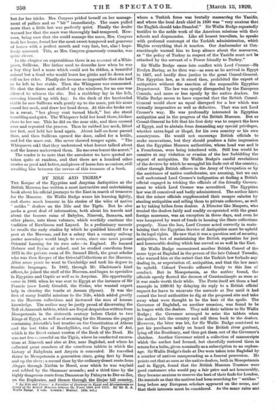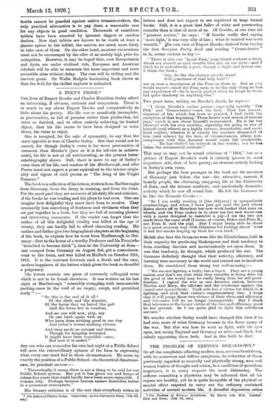BY NILE AND TIGRIS.* Trim Keeper of the Egyptian and
Assyrian Antiquities at the British Museum has written a most instructive and entertaining book about his official journeys to the East in search of treasures for the Museum. Sir Wallis Budge wears his learning lightly, and shows much humour in his stories of the wiles of native
antika " dealers on the Nile and the Tigris. But he also packs a great deal of information, both about his travels and about the famous ruins of Babylon, Nineveh, Samarra, and other places, into these volumes, which worthily continue the tradition of Rawlinson and Layard. In a preliminary memoir ho recalls the early studies by which he qualified himself for a post at the Museum, and for a salary that a country railway porter nowadays would laugh to scorn, since ono must pursue Oriental learning for its own sake—in England. He learned Hebrew and Syriac at school, and he studied cuneiform from 1873 in the private room of Dr. Samuel Birch, the great scholar who was then Keeper of the Oriental Collections at the Museum. After sonic years he went to Cambridge and took his degree in Semitic languages. In 1882, through Mr. Gladstone's kind offices, he joined the staff of the Museum, and began to specialize in Egyptian and Coptic as well as in Assyrian. His opportunity came in 1886, when he was sent to Egypt at the instance of Sir Francis (now Lord) Grenfell, the Sirdar, who wanted expert help in clearing the tombs at Assuan (Syene). It was the first of many fruitful missions to the Nile, which added greatly to the Museum collections and increased the sum of human knowledge. The author may bo justly proud of discovering the Tell el-Amamah tablets, which are Royal despatches written from Mesopotamia in the sixteenth century before Christ to two Kings of Egypt, as well as of securing for the Museum the papyri containing Aristotle's lost treatise on the Constitution of Athens and the lost Odes of Ba,cchyllides, and the Papyrus of Ani, which is the finest extant version of the Book of the Dead. He was not less Ezccessful on the Tigris, where he conducted excava- tions at Nineveh and also at Der, near Baghdad, and where he collected great numbers of the cuneiform tablets in which the history of Babylonia and Assyria is concealed. He travelled thrice to Mesopotamia a generation since, going first by Basra and up the river; a second time by the ordinary desert route from Aleppo through Nisibin to Mosul, near which he was waylaid and robbed by the Shammar nomads; and a third time by the highly dangerous route from Damascus by Palmyra to Der-es-Zor, on the Euphrates, and thence through the Sinjar hill country, • By Nile and Tigris : a Narrative of Journeys in Egypt and Mesopotamia on behalf of the British Museum between the Years 1886 and 1913. By Sir B. A. Wallis Budge. 2 vols. London : Murray. [63a. net,'
where a Turkish force was brutally massacring the Yazidis, and where the local Arab chief in 1890 was " very anxious that the English should take Stambul." Sir Wallis Budge repeatedly testifies to the noble work of the American missions with their schools and dispensaries. Like all honest travellers, he speaks with profound contempt of the Turkish administration, which Blights everything that -it touches. Our Ambassador at Con- stantinople warned him to keep silence about the massacres, as " the policy of Turkey in respect of the Yazidis must not be attacked by the servant of a Power friendly to Turkey."
Sir Wallis Budge came into conflict with Lord Cromer--Sir Evelyn Baring, as he then was—as soon as he arrived in Egypt in 1887, and hardly does justice to the great Consul-General. The Egyptian law, as it stood then, prohibited the export 01 antiquities without the sanction of the responsible Egyptian Department. The law was openly disregarded by the European Consuls, and more or less openly by the native dealers. Sir Wallis Budge seems to have expected that the British Consul- General would show an equal disregard for a law which was virtually inoperative as well as defective. That was not Lord Cromer's way. He was profoundly interested in Egyptian antiquities and in the progress of the British Museum. But as Consul-General he felt that his first duty was to respect the laws of Egypt, and to abstain from demanding any special privileges, whether extra-legal or illegal, for his own country or his own countrymen. He would not encourage British officials to make excavations, lest they should produce a false impression that the Egyptian Museum authorities, whose head was and is a Frenchman, were being interfered with. Still less would he connive at any violation or evasion of the law forbidding the export of antiquities. Sir Wallis Budge's candid revelations of the devices by which he smuggled his finds out of the country, either through British officers in the Army of Occupation or by the assistance of native confederates, are amusing, but we can well understand Lord Cromer's indignation at finding a British official engaged in tricking the officials of the friendly Govern- ment to which Lord Cromer was accredited. The Egyptian law was ill conceived and badly administered. The author hints that the minor officials supplemented their meagre salaries by stealing antiquities and selling them to private collectors, as well as by taking bribes from dealers. A Director like Maspero, who treated the dealers fairly and readily co-operated with the great foreign museums, was an exception in those days, and even he was hampered by want of funds in housing the State collections properly. None the less, Lord Cromer acted correctly in main- taining that the Egyptian Service of Antiquities must be upheld in its legal rights. He saw that it was a question not of securing antiquities, but of maintaining the British reputation for just and honourable dealing which has served us so well in the East.
Sir Wallis Budge encountered another British Consul of the same type at Baghdad in the person of the late Colonel Tweedie, who warned him at the outset that the Turkish law forbado any dealing in, or exportation of, antiquities, and that the law must be uphold. Colonel Tweedie adhered firmly to this line of conduct. But in Mesopotamia, as the author found, the officials openly flouted the decrees of Constantinople as soon as it was made worth their while. The Porte itself set them a bad example in 1890-91 by delaying its reply to a British official request for leave to excavate the mounds at Der until it had caused the local authorities to dig at the proposed site and take away what were thought to be the best of the spoils. The Governor of Baghdad, on another occasion, was found to be in league with the dealers. They sold their tablets to Sir Wallis Budge ; the Governor arranged to seize the tablets when the author left the country and sell them back to the dealers. However, the biter was bit, for Sir Wallis Budge contrived to put his purchases safely on board the British river gunboat, lying off the Residency, and thus got them out of the Governor's clutches. Another Governor seized a collection of manuscripts which the author had formed, but cheerfully restored them in return for a bribe, given nominally as a subscription to an orphan- age. Sir Wallis Budge's finds at Der were taken into Baghdad by a number of natives masquerading as a funeral procession. Ho points out that as soon as the native dealers, both in Mesopotamia and in Egypt, found that the British Museum Trustees were good customers who would pay a fair price and act honourably, they became anxious to reserve the best of their finds for London. He reminds us that the natives had been searching for " a,ntikas " long before any European scholars appeared on the scene, and that their interests must be considered. As the many ruins and tombs cannot be guarded against native treasure-seekers, the only practical alternative is to pay them a. reasonable sum for any objects in good condition. Thousands of cuneiform tablets have been smashed by ignorant diggers or careless dealers. Now that tablets are known to be worth at least a piastre apiece to the infidel, the natives are much more likely to take care of them. On the other hand, amateur excavations must not be encouraged by the offer of an unduly high price for antiquities. However, it may be hoped that, now Mesopotamia and Syria are under civilized rule, European and American scholars will be able to excavate the more important and more accessible sites without delay. The cost will be trifling and the harvest great. Sir Wallis Budge's fascinating book shows us that the field for the skilled explorer is unlimited.











































 Previous page
Previous page